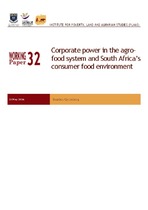Corporate power in the agrofood system and South Africa’s consumer food environment
Abstract
This report maps the extent of corporate power in the South African agro-food system using a value chain
approach. It identifies major corporate actors in the various nodes of the agro-food system as of 2014.
Some nodes tend to be dominated by corporations, for example input supply, grain storage and handling,
and feedlots for commercial livestock. Other nodes have a strong corporate core but there is also a wide
periphery, for example agricultural production, food manufacturing, wholesale and retail and consumer
food service. The large periphery of marginalised actors in some parts of the system point to possible
areas of intervention to boost livelihoods by supporting economic activity in the periphery. Although
there are pockets of concentrated power in the system as a whole, there is also some distribution of
power across nodes as well as between commodities. Vertical integration is less prevalent than in the
past. The report looks at governance in the food system, the expansion of corporate self-regulation, and
the implications for food security and nutrition. Corporations have immense power in structuring
consumer perceptions on food quality and health, from input into apparently neutral dietary-based
guidelines to advertising. Financialisation in the food system, including the institutionalisation of share
ownership and the rise of agri-investment companies, and the multi-nationalisation of South African
agro-food capital especially into Africa, have implications for the ability of the nation state to regulate
activities in the agro-food system.

